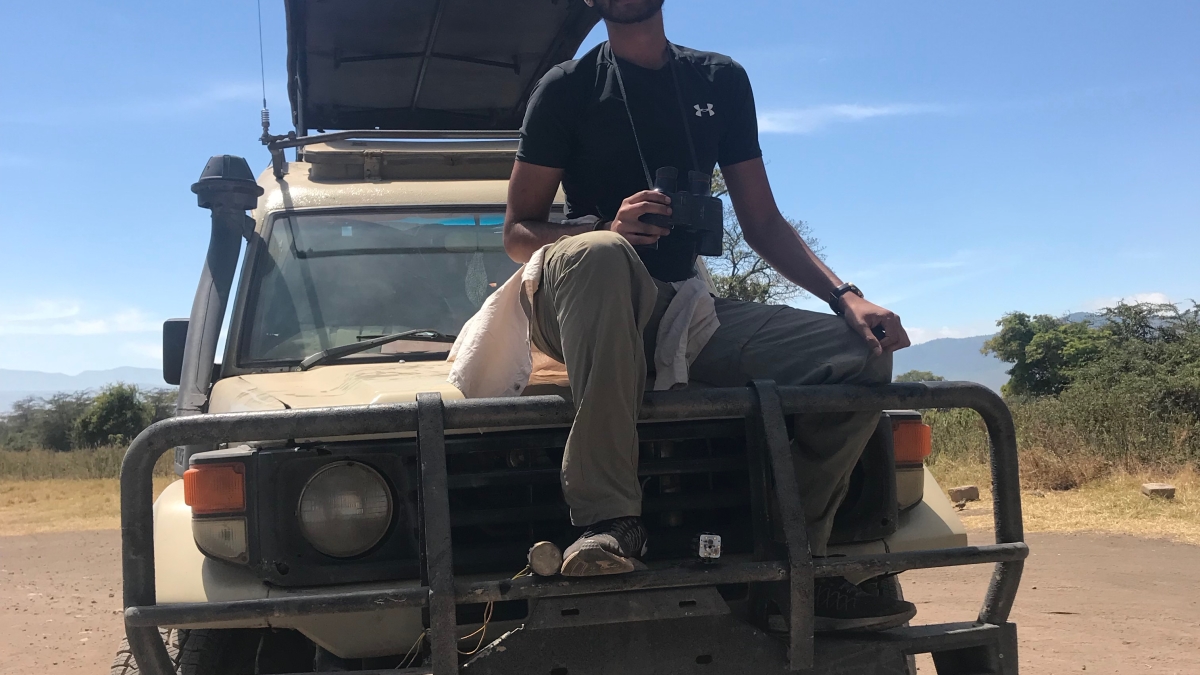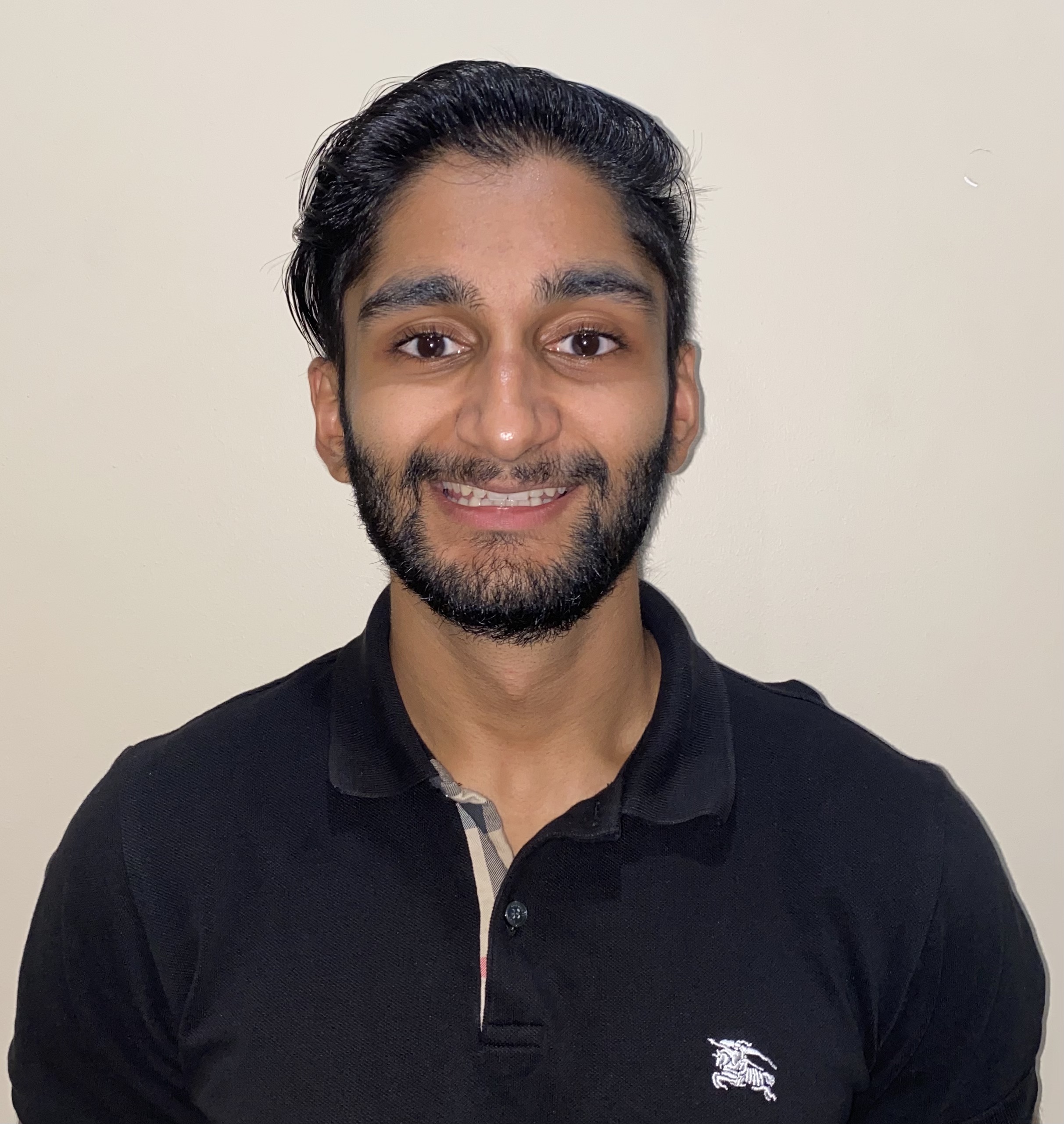Trip to Tanzania engaged outstanding grad to learn more about public policy, health care

Nikhil Dholaria, School of Public Affairs, spring 2022 Watts College Outstanding Graduate, while in Tanzania his freshman year. Photo courtesy Nikhil Dholaria
Editor's note: This story is part of a series of profiles of notable spring 2022 graduates.
Much of Nikhil Dholaria’s youth involved stories his parents and grandparents told of the world they lived in as farmers. The tales shaped his desire to serve others.
“Coming from a culture of farmers who dedicated their lives to feeding others, I found myself playing off that lifestyle by caring for other people,” said Dholaria, the spring 2022 Outstanding Graduate from the School of Public Affairs, who also studied at Barrett, The Honors College.
It didn’t take long for the Arizona native from the West Valley city of Glendale to seek to make good on that desire to serve.
As a college freshman, he enrolled in what his professors called the “most rigorous study-abroad program the university has to offer,” which after six months of training in public speaking and cultural sensitivity, sent him to the African nation of Tanzania to teach the people who lived there about how to prevent HIV/AIDS.
“At first, I never believed that I could do it and I even considered dropping the program. I was afraid to speak and lacked the confidence to talk about sexual health to a group of strangers,” said Dholaria, who earned a Bachelor of Science degree in public affairs and public policy (health policy) and a Bachelor of Arts degree in biochemistry.
“The first few weeks in class were unsettling. Each time I was called on to speak or practice our teaching templates out loud, I heard my own frustration. My voice stuttered and I ended up repeating myself. My breathing escalated and I felt droplets of sweat journeying down the back of my neck. I felt anxious and uncertain,” he said. “It seemed that defeat was inevitable. Yet, my desire to teach a community about HIV/AIDS and immerse myself with a new culture renewed my passion. I decided to continue.
“While working in Tanzania, I recognized that it required vulnerability to care for others and I found that the same applied to medicine. Caring for others entails the acceptance of one’s own uncertainty while still providing a sense of hope.”
Read on to learn more about Dholaria’s ASU journey:
Question: Tell us more about how that Tanzania trip helped you realize you wanted to study public policy, health care and biochemistry.
Answer: Seeing the struggle that many Tanzanians — and people around the world — have in terms of access to health, I wanted to learn more about this social dilemma and find novel ways to solve it. My end goal was to work in medicine and while I already had enrolled in a biochemistry major to obtain my prerequisites, I wanted to expand on my knowledge of medicine.
While working in Tanzania, I recognized that it required vulnerability to care for others and I found that the same applied to medicine. Caring for others entails acceptance of one’s own uncertainty while still providing a sense of hope.
I started taking non-premedical courses and even found a love for service through policy. Public policy can tackle the inequities in healthcare, and I know for a fact that learning more about this will not only aid my academic endeavors in medical school, but also as a practicing physician.
Q: What’s something you learned while at ASU — in the classroom or otherwise — that surprised you, that changed your perspective?
A: Surprisingly, I feel that I learned the most about myself and my vocational goals in medicine when I decided to step away from my strictly premedical experience at the university and explore the world of the creative arts.
With ASU’s novel COVID-19 saliva test, I decided to help reiterate this story of crisis response through a documentary film. Although I had no prior background in the process of film creation, I had an interest in storytelling through film and journalism.
By interviewing faculty and students, I understood the value of the interdisciplinary field in medicine, or in any field for that matter. Although the COVID-19 pandemic required frontline health care workers, a response to this crisis required more than just healthcare workers; it required everyone. ASU’s response to the pandemic required the collaboration of faculty from different parts of the university. I decided to make this a central theme in the film.
I recognized that collaboration is essential in the practice of responding to a crisis. It took a team of people to fight the coronavirus, and I realized that the same applied to medicine. It takes a team of diverse individuals to care for others, not just one.
By venturing into film and journalism, I realized the value of collaborating with people from different backgrounds. Though accustomed to working independently, I learned that patient care is more than a doctor treating an illness. Patient care involves families, friends, co-workers and everyone in between.
Q: Why did you choose ASU?
A: Being a native Arizonan, I found a love for the Arizona community. Whether it was through volunteering or working with students in my private tutoring gig, I wanted to continue serving the community that raised me into the man I am today. And I knew that continuing my education in-state would allow me to better appreciate the members of the Arizona community and find alternative ways to continue supporting them and serving them.
Q: Which professor(s) taught you the most important lesson(s) while at ASU?
Nikhil Dholaria. Photo courtesy Nikhil Dholaria
A: Two professors immediately come to mind. The first is Damien Salamone, a professor who transformed me from an introverted, shy boy into a public speaker who is not afraid to stand up for others and speak the truth. Dr. Salamone prepared me for my study abroad program in Tanzania. Along the six months of training, I saw myself transform. Once a cutthroat premed student, I evolved into a more compassionate and understanding person. The most important lesson that he taught me was to listen to people, something that we all take for granted.
The second professor who has had a profound role in structuring the person I am today is Rosemarie Dombrowski. Dr. Dombrowski solidified my love and appreciation for the interdisciplinary, especially in the humanities. As a pre-med student, I was so involved in strictly “pre-medical” activities, whether that be interning with a doctor or researching in a laboratory. Dr. Dombrowski, who teaches HON 394, Poetry in Medicine, helped me understand that there is much more in which I could involve myself. While I had been trying to involve myself into other disciplines, like film and storytelling, Dr. Dombrowski was the one who helped me understand that I can learn more about myself and others when exploring other fields.
I believe that a doctor is not just responsible for treating a patient, but also hearing their story and listening to them. Being a physician is not just treating and studying what the human is, but also who the human is. Listening to their stories, understanding their position, and treating them like family is what I believe in. Learning from Dr. Salamone and Dr. Dombrowski helped me start my journey to become not just a better physician down the line, but also just a better person.
Q: What’s the best piece of advice you’d give to those still in school?
A: Get involved in activities and extracurriculars not necessarily related to your major or career track. By taking a step away from what you are comfortable with, you can learn more about yourself and others. Collaboration is found in almost any field of work; by understanding other disciplines and people, we can begin to expand our own knowledge while working together to expand others’ knowledge.
Q: If you are an on-campus student, what was your favorite spot to study, meet friends or to just think about life?
A: I like to move around campus, but if I were to pick a spot that has meaning to me, it would be Armstrong Hall on the Tempe campus. This place is nostalgic for me, because I would spend long nights studying there with my peers, or just having conversations with them. It was the place where I could work when I needed to and it was the place where I could stay in contact with many of my friends, who I now call family.
Q: What are your plans after graduation?
A: After graduation, I hope to attend medical school. If I do not get accepted into medical school right after graduation, I plan to continue studying for a master’s degree in a humanities discipline. Medicine is my vocational goal and no matter how long it takes, I will keep trying until I get that acceptance into a medical school. But if my post-graduation plans do not work out, I will also continue developing my nonprofits — one supports a Tanzanian organization overseeing youth athletics, the other offers one-on-one mentoring to underprivileged college students — and continue serving others.
Q: If someone gave you $40 million to solve one problem on our planet, what would you tackle?
A: When I started my own nonprofit organization, I quickly learned that while giving money to others may help, it only does so temporarily. The recipients became dependent on the charitable donations, which defeated the purpose of giving. If I had $40 million to give, I would donate to humanitarian organizations which advocate for free-thinkers. Many places in the world suppress ideas and beliefs that people may have. I believe that everyone can have an idea and that everyone should have the opportunity to be heard. By empowering those in need to act for themselves, they may be able to find more sustainable methods of charity that can help them progress beyond monetary donations.
More Arts, humanities and education

ASU professor's project helps students learn complex topics
One of Arizona State University’s top professors is using her signature research project to improve how college students learn…

Award-winning playwright shares her scriptwriting process with ASU students
Actions speak louder than words. That’s why award-winning playwright Y York is workshopping her latest play, "Becoming…

Exceeding great expectations in downtown Mesa
Anyone visiting downtown Mesa over the past couple of years has a lot to rave about: The bevy of restaurants, unique local shops…


